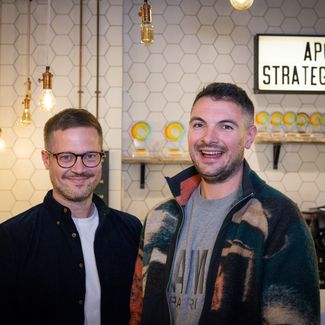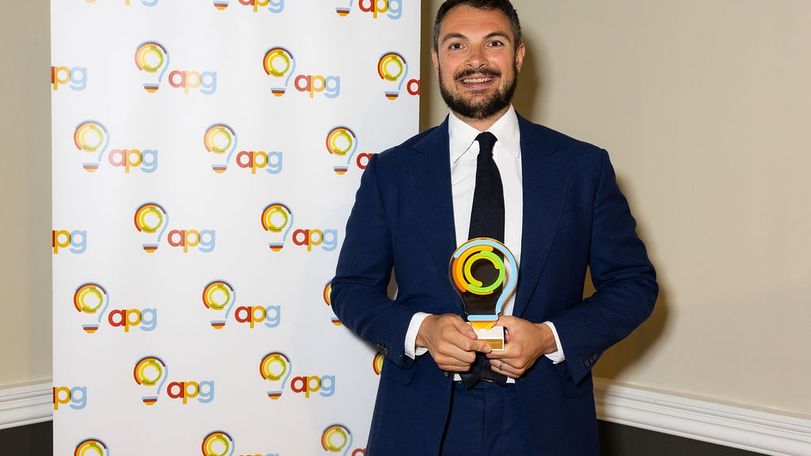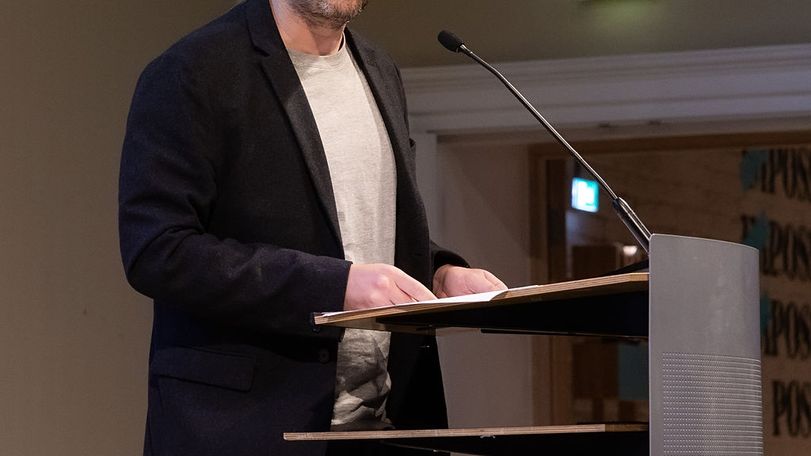
‘Effectiveness is fundamentally about making money for clients’
Adam&eveDDB CSO Martin Beverley and head of planning Will Grundy discuss what it means to have a strong culture of planning and effectiveness
15 November 2023
No argument: it’s been a pretty impressive awards year for adam&eveDDB. The agency was D&AD’s Agency of the year and the most-decorated UK creative agency at Cannes Lions.
But we’re not here to talk about creativity. This is about effectiveness - though of course we all know that the most creative ads are usually the most effective.
Last week, a&eDDB picked up a Gold at the 2023 Effie Awards UK for its CALM (Campaign Against Living Miserably) 'Last Photo' campaign. The agency has also cemented itself as a planning powerhouse by attaining the Stephen King Strategy Agency of the year for the fourth year in a row at the APG Awards - something no other advertising agency has ever achieved.
Its undeniably powerful work for CALM (Campaign Against Living Miserably) - which was based on the insight that suicidal behaviour does not always appear to be suicidal - won adam&eveDDB gold at the APG Awards. One Silver, three Bronze and one ‘Long Term Thinking Bronze’ were also awarded for a host of campaigns including ‘Sales Go Wacko for Schmackos’, ‘Tackling the biggest anomaly in football’ for EA Sports FIFA, ‘Seeing Red’ for Hey Girls, ‘#WeThe15’ for the International Paralympic Committee, and ‘Skittles + Pride’.
So what makes adam&eveDD’s planning department so distinguished? We talk to chief strategy officer Martin Beverley and head of planning Will Grundy to explore their effectiveness culture.
Creative Salon: What contributed to adam&eveDDB's landmark APG Agency of the Year win?
Martin Beverley: The main reason for the continued success is that we are lucky to have brilliant talent, putting their brilliant minds to some brilliant brands and businesses. We look around our planning department and feel fortunate that we get to work with them every day. In meetings I often think: “This lot are really bloody clever.” They care a lot about what they do and our job is to create the right conditions for them to do their job. We like it to feel collegiate, where everyone can learn from each other.
All of that might sound soft, but we are hard on standards. We want people to do the best work of their careers and be proud of their output. We take some of the award shows, like APG and IPA seriously, because we believe it’s an outcome of doing the best work in the business.
Will Grundy: We believe that the work is only as good as what you're able to prove. The APG and IPA awards give us an opportunity to not only demonstrate the brilliance of the thinking but also genuinely prove that it worked and that it impacted our clients’ businesses and their consumers - and culture as well when appropriate. While we do have a healthily toxic relationship with competition we also genuinely believe that it's a key part of our job to prove to clients that the work works. I think one of the reasons why we've won the APG Agency of the Year award four times is because the more we prove it, the more we can do the type of work that we're proud of. And the more work we do that we're proud of, the more we can win all of those wonderful awards as well. So it's a bit of a virtuous circle.
What work are you most proud of in terms of the strategy that has gone into campaigns?
Grundy: Personally, I'm most proud of the work that we've done for CALM. I have a very personal relationship with CALM as an organisation outside of work - I sit on their non-exec trustee board - but professionally, the work has all the ingredients of a brilliant, brilliant adam&eveDDB campaign. There's an amazing, deep human insight at the heart of it in terms of what suicidal does and doesn't look like. And the work has been executed with such care, craft and bravery in terms of the shape of the campaign. Because of this it stood out and punched well above the weight of similar campaigns in the charity sector and campaigns in general.
Martin Beverley: We’re also very proud of our longer term campaigns. With Marmite we managed to create one of the most famous and enduring campaigns in the country, by finding fresh insight into the nation’s love and hate of a jar of yeast extract. The campaign has such a lovely product truth at its heart. Our job is to keep it fresh and keep adding new dimensions, whether that be exploring whether love for Marmite is genetic or not, or hypnotising haters into being lovers or doing scans of babies - we want the brand to continue to be a part of conversations.
For John Lewis, we managed to make Christmas ads part of popular culture, make the brand the most loved in the UK four years running, and return over £1 billion in incremental revenue. We're so proud of that work. It meant so much to us and for years we poured a lot of heart and soul into those campaigns. Whilst we don't work with John Lewis anymore, we're still very proud of that work. The strategy was dead simple and we stuck to what worked and as a result had an enduring capital for those Christmas ads.
Also with Volkwagen, we managed to take a German brand to number one in the UK car market, by adding humour and humanity to the brand’s advertising.
We are proud of all of our strategy babies, but these [above] are some of our favourite children.
Obviously, a strong planning and effectiveness culture has helped adam&eveDDB win awards and an industry reputation. Do you have a clear definition of what effectiveness is?
Grundy: Effectiveness is about meeting our clients’ objectives and fundamentally making money for them. It's easy for agencies to sometimes get distracted, certainly with the purpose debate taking place recently, but fundamentally we're in the business of making money for our clients, and every other objective has to stack up to that. It's as cut and dried as that but sometimes we look for a couple of other things, as well as proof of effectiveness - whether it be a cultural impact or a conversation that has never been had before. However, most of the time, regardless of sector, brands or budget, it's all about creating more money for our clients so that they can continue to grow and thrive in whatever way works for them.
Many of our clients do take marketing effectiveness seriously (that might be one of the reasons why they choose to partner with us). If you are a marketer and you aren’t taking marketing effectiveness seriously, then it is probably difficult for the boardroom to take you seriously.
We always look to set objectives from the outset, so that we are clear on what we are trying to achieve and can measure our success accordingly.
If we are ever in doubt, we ask Les Binet, our resident Godfather Of Effectiveness, and thankfully he invariably has the answer.
What metrics work best for measuring effectiveness today?
Beverley: The most important metric for our commercial clients is how much additional money they are making thanks to our work together. Ultimately, every other metric is in service of that and ladders up to that.
Often the most effective brands focus on one or two key metrics as a lighthouse. Too many brands seem to measure too much and then aren’t truly clear on what they are trying to achieve. If we are not boosting clients’ businesses, I'm not entirely sure what we're all doing every day. That's partly why they work with adam&eveDDB, because they know that we are going to take effectiveness seriously. Lots of the other metrics are in service of that ultimate metric in terms of the incremental profit.
There's some debate around whether the industry is a little bit obsessed with ROI and efficiency. It's possible to get a very high ROI by not spending very much but ultimately it's about total profit not the efficiency with which you generate that money. I think sometimes the industry slightly forgets that or wants to pretend it's doing something more noble.
"People have been talking about whether we've reached peak purpose for a year or so now. I'm sure we have. You couldn’t have had more purpose-led case studies at Cannes. We're here for growth and with the economy at the moment people want to look at the money a little more. When everything's rosy it's easier to look purposeful and to be a bit more virtuous."
Martin Beverley, CSO, adam&eveDDB
CS: The industry seems to be veering away from purpose-led campaigns. Unilever CEO Hein Schumacher has even admitted that for some brands purpose “simply won’t be relevant”. What is your take? And how will this step away from purpose affect the effectiveness of campaigns?
Will Grundy: With regards to the purpose debate, I think that if you're a genuinely purposeful brand that makes a positive difference in society, for us it's all the more important that we make you money, because that's the most effective way for you to enact whatever positive and social good you're creating. Focusing on that allows us to grow those businesses ahead of competitors who might be less purposeful. We exist to grow our clients' businesses and that is powerful and noble in its own way.
Martin Beverley: People have been talking about whether we've reached peak purpose for a year or so now. I'm sure we have. You couldn’t have had more purpose-led case studies at Cannes. I understand that Cannes is not the entirety of the industry but it felt like the balance had. Unilever, who were almost figureheads for purpose - their CEO has basically just admitted to over-doing it.
Purpose works for some brands but not all brands. We're here for growth and with the economy at the moment people want to look at the money a little more. When everything's rosy it's easier to look purposeful and to be a bit more virtuous. But it's so tough out there at the moment.
"If you look at the Christmas ads at the moment, most of the planners behind the campaigns probably told clients: 'We need to offer a little bit of joy.' The difficulty is sometimes that means that everyone ends up doing the same thing so you still need to genuinely cut through to be noticed."
Will Grundy, head of planning, adam&eveDDB
Planning has the ability to be a big picture discipline. And 2023 has been full of political & social upheavals - the cost of living crisis and of course the Ukraine/Russia wars and Israel/Palestine conflicts. So how are you helping brands reimagine their business in the context of these changes?
Grundy: There's two degrees to it. On one hand, we feel quite strongly, particularly with issues like the war in Ukraine or the Israel/Palestine conflict, that those are areas that no brand should be touching because they're far too complex. We are not sure that there are any brands in the world that should have a role in the complexity of the Israel/Palestine conflict, beyond offering aid behind the scenes.
On the other hand, what we do spend a lot of time thinking about is - what are the fundamental impacts that moments of crisis are going to have on our customers and on their spending habits? It's not for us to weigh in on these issues but as a department we need to understand the consequences of these issues in very real terms for consumers and then understand what that means for brands who we are trying to grow.
Beverley: When the world around us is filled with fear, uncertainty and challenges, brands can potentially become an either ally or an antidote. Some brands, in particular categories, can offer genuine support in people’s lives. Other brands can simply offer comforting consistency and reassuring familiarity. We help brands define the relevant and realistic role they can play in people’s lives. Sometimes the role that they play can just be a little bit of escapism. We can have a bit of fun because according to research people want a bit of entertainment from brands.
One of the ultimate impacts that really does affect all of our clients is the cost of living crisis. Value for money is always really important but it's so important at the moment. We have to get the equation right and make sure that the balance is there in terms of what you get versus with what you pay - because that will be scrutinised more and more.
Grundy: Because of the cost of living crisis we have to connect what we do to pricing-power with a little bit more discipline and rigour. Yes, advertising is about providing escapism and entertainment, but actually in the boardroom, pricing power is seen as valuable and an economic driver as much as anything else. I think agencies are only really beginning to have that discussion now.
We're also helping clients realise that whatever do they have to do it with a bit of distinctiveness and flair. If you look at the Christmas ads at the moment for example, most of the planners behind the campaigns probably told clients: “We need to offer a little bit of joy.” The difficulty is sometimes that means that everyone ends up doing the same thing so you still need to genuinely cut through and be noticed.
Beverley: Price is really important. The industry doesn’t really talk about it enough because in so many categories, the role of a brand is to get consumers to pay a bit more for something that is effectively the same. People will pay a little bit more for Heinz for example and that is the power of a brand. You can really see a difference in the cost of living crisis because strong brands still hold up.
More people are becoming sceptical of advertising and at the same time also demand certain social and ethical standards from brands - what do you think the big trends are in terms of consumer behaviours and their expectations from brands?
Beverley: Research that uses claimed behaviour will often suggest that people are making choices based on social and ethical standards. However, in reality, people choose brands that come to mind first and deliver on what people want. In a cost-of-living crisis, this observation is even more acute as value-for-money becomes the predominant decision factor. Getting value right is a timeless trend for every brand to continue to get right.
On the whole, there are a minority of customers that will go out of their way to buy eco-friendly brands. People, particularly in the cost of living crisis, will default to what comes to mind, what is easy and what is good value. I think the industry sometimes gets it wrong in thinking that sustainability has to be serious rather than just really fun or really desirable. Just telling people that it is better for the environment is not necessarily going to work.
"Arguably, AI will make it easier to make the middle of the road stuff very quickly and efficiently. But if you're a brilliant and crazy agency that can do things differently and laterally, there'll be even more value in human creativity."
Martin Beverley, CSO, adam&eveDDB
What is the future of planning?
Grundy: We often say to clients that there's no point building a strategy based on what you think is going to change. You need to base it on what's not going to change. When you think about the future of planning the fundamentals aren’t going to change - defining business problems, understanding people, inspiring creative solutions, proving that our efforts are effective. But I think what's exciting is the tools that we have at our disposal, both strategically and creatively, to bring our ideas to life, particularly with artificial intelligence becoming way more mainstream and understood.
I also think that planning will have to be the voice for human creativity more than ever before. There will be a massive desire from businesses to want to reduce cost in their marketing function because so much of it can be automated. In order for us to withstand that, we're going to have to prove that there's a disproportional business case for brilliant creative thinking and brilliant planning to exist and once more proving that it works. Planners are the ones who can have that conversation with and for clients - and that will be more and more important as technology continues to proliferate.
With our Veg Power campaigns, we managed to use creative strategy to get kids eating a billion more portions of vegetables through our ‘eat them to defeat them’ campaign. The brilliant planner's insight at the heart of that is don't tell kids that veggie is good for them, tell them that it's really bad. It's evil. If you ask AI to give you five strategies to get kids to eat more vegetables, it will never get to that kind of lateral ability to rethink a problem or reframe a decision. That's not to say it won't get there.
Beverley: The problem with AI is that its output isn’t good enough in the way of creativity. Most advertising is just not remembered. It leaves no impression. By definition, you have to do something interesting to get people's attention in the first place. Arguably, AI will make it easier to make the middle of the road stuff very quickly and efficiently. But if you're a brilliant and crazy agency that can do things differently and laterally, there'll be even more value in human creativity.








